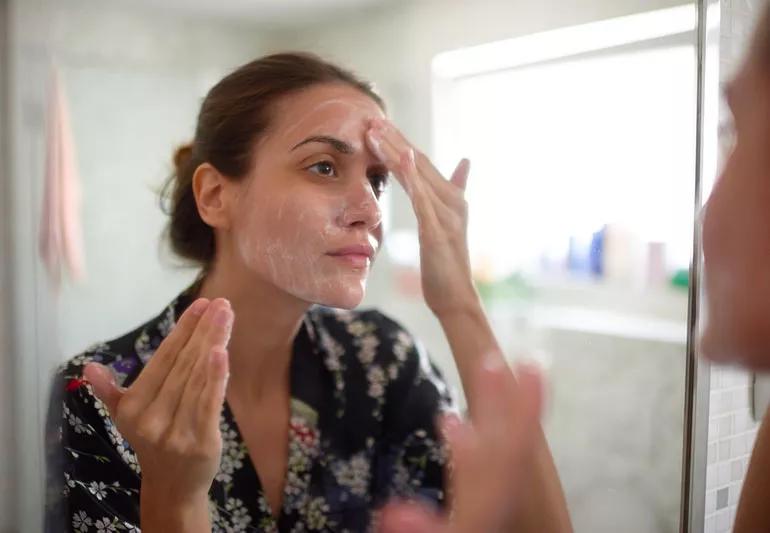Creams made with live bacteria are the latest trend, but can they solve complexion problems?

Feel like the skin care aisle at the pharmacy just isn’t overwhelming enough? Never fear! There’s a whole new section of creams and lotions to figure out: probiotic skin care products.
Advertisement
Cleveland Clinic is a non-profit academic medical center. Advertising on our site helps support our mission. We do not endorse non-Cleveland Clinic products or services. Policy
So what’s the scoop on this latest trend? You’ve likely heard of oral probiotics, the good-for-you bacteria found in supplements, gummy candies and yogurt. In our guts, a balanced community of bacteria aids digestion and helps us fight illness.
Can probiotic skin creams offer similar benefits for your complexion? Dermatologist Shilpi Khetarpal, MD, weighs in on what probiotic skin care products can do for you.
Your skin is a crowded place. “Over a thousand species of bacteria live on the surface of our skin,” Dr. Khetarpal says.
Don’t squirm. The skin microbiome, as it’s known, is a good thing. “Those bacteria are essential to fight infection, protect against environmental damage, regulate pH levels and keep the skin hydrated and healthy,” she adds.
Unfortunately, plenty of things can throw the bacterial balance off. Soaps, face scrubs and medications like antibiotics can tip the scales in favor of harmful bacteria.
This bacterial imbalance can cause flare-ups and problems including:
If you experience any of those skin woes, probiotic creams might help.
New skin care products aim to restore balance to your skin bacteria in a couple of ways. Probiotic creams contain live cultures of good bacteria. Others, called prebiotics, contain ingredients that fuel the growth of the helpful germs that already live on your skin.
Advertisement
If you’ve got skin that’s naturally glowing and happy, you don’t need to add an extra step (and extra cost) to your skin care routine. But if you have skin problems such as acne, eczema, rosacea or dryness, it’s worth considering, says Dr. Khetarpal.
Probiotic products probably won’t solve these skin issues completely, she adds. “There are likely several factors that contribute to your symptoms. But an imbalance of the skin’s bacteria might be one piece of the puzzle,” she adds.
Unfortunately, you can’t tell which products are well-tested by looking at the labels. Fancy packaging and high price tags don’t necessarily equal more bacteria or better results.
Ready to give probiotic skin care a whirl? Your next step is sorting through your options. Only some products on the market have undergone scientific testing, Dr. Khetarpal says. And only a few of those were actually tested on human skin.
If researching study results in scientific journals isn’t your idea of fun, your best bet is to talk to a dermatologist about your options.
Probiotic products can restore balance to your skin. But it’s a good idea to keep your bacterial pals healthy in the first place. How can you do that?
With tweaks to your cleansing routine — and maybe a new probiotic product or two — your resident bacteria are likely to find their equilibrium. When it comes to your skin, that’s a beautiful thing.
Advertisement

Sign up for our Health Essentials emails for expert guidance on nutrition, fitness, sleep, skin care and more.
Learn more about our editorial process.
Advertisement

Although it could be used as a moisturizer, this new trend is not recommended

It’s a great disinfectant for around your home, but not for your skin

Changes in texture, smell, color and performance are signs it’s time to throw the cosmetic item away

Strengthening your skin barrier, simple routines and minimizing products are ongoing, popular trends

Moisturizing, running a humidifier and adjusting your showers may help keep itchiness and irritation at bay

Glycolic acid benefits skin tone, texture and pigmentation by exfoliating dead skin

Some gentle soap and warm water go a long way when you’re washing these cosmetic tools regularly

New formulas are less drying and contain water-based and skin-loving ingredients

Even small moments of time outdoors can help reduce stress, boost mood and restore a sense of calm

A correct prescription helps your eyes see clearly — but as natural changes occur, you may need stronger or different eyeglasses

Both are medical emergencies, but they are very distinct events with different causes